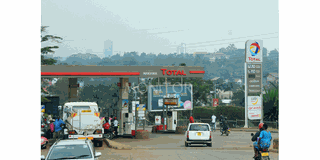Govt should reduce excise duty on fuel

Fuel prices have continued to increase in Uganda with government saying it will not reduce taxes on essentials.
What you need to know:
- Ugandans are not asking this government to place subsidies on all consumer commodities like Mr Museveni said.
While some of President Museveni’s reasons for not reducing tax on fuel and putting subsidies on consumer commodities are valid, his government must cut excise duty/other taxes on petrol and diesel immediately to avoid any political backlash.
If it dithers anymore, as it has for months, this government risks earning the reputation of a bad inflation manager and getting electorally vulnerable in the by-elections that are coming up and other general elections.
Petrol and diesel are selling at record prices and damaging voters’ perception of the government.
In this period, every time a vehicle owner takes out his wallet to pay for fuel much more than he did last time, he’s looking for someone who can take the blame for the skyrocketing prices.
Secondly, since fuel prices affect everyone, it gets into the centre of all conversations.
It’s almost impossible for car drivers to escape radio jockeys’ relentless reference to runaway prices mainly because almost every radio station thinks talking about fuel prices gives them an easy connection with listeners. It’s the same for newspapers and TV channels. This massive media coverage begins to upset even those who don’t use private transport or afford fuel or other worries to get anxious about fuel prices.
Since Uganda is an importer of oil, stock, bond and currency markets too start spinning with oil prices which is followed by a flood of commentaries from economists and other market experts concerned about the health of the economy.
To ordinary citizens, who barely understand or care about terms like current account deficit, these experts’ views and news headlines signal something getting terribly wrong and one piece of evidence that backs their anxiety is their rising fuel bill.
They start seeing inflation even in those goods and services whose rates haven’t moved a bit due to oil. The Kenyan government, working with maize millers, has placed a subsidy on maize flour.
Ugandans are not asking this government to place subsidies on all consumer commodities like Mr Museveni said.
We can be a little bit relieved if the government subsidises on maize flour and reduces excise duty on fuel only. Surely, if in 2020 the NRM government had the power to increase excise duty on fuel, it would have the same power to reduce it by a few shillings.
Otherwise, the political opposition has moved in for the kill, throwing oil into the raging consumer fury by their regular harsh criticisms and sound bites. The aim is to make the price rise look like a major public policy failure due to the incompetence of the government.
If the government is unable to do much to control fuel prices, voters see it as a sign of not just the state’s incompetence but also its lack of concern for ordinary people.
This further aggravates things when the President, ministers and NRM party leaders start explaining how the government is helpless before international market forces. People don’t want a ‘helpless’ government. They perceive this as betrayal by a party that had promised them the moon during polls.
The folks in Kisekka Market, Kidera Village, Mparo Village, and Kinoni, among others, don’t understand how a war in Ukraine can affect the price of a quarter of a kilogramme of posho.
Instead of sounding helpless, the government has to do something to protect its political future.
The politically prudent step would be to cut excise duty by a small amount once, and undertake smaller cuts to grab headlines and change the wider narrative.
Given the international price fury, a cut per litre on fuel and a subsidy on maize flour now wouldn’t do much to voters financially, but will give them a feeling that the government they elected to power cares about them. It’s now a feeling of neglect and hopelessness from the citizens.
People in government have been telling citizens that higher taxes on petrol, diesel and other consumer commodities were needed to fund social welfare programmes or build roads and bridges.
This wouldn’t cut much ice with the citizens as they know that most bridges, roads were built and Uganda Electricity Board infrastructure was laid even before the NRM/NRA government came to power.
Phillip Kimumwe, [email protected]




